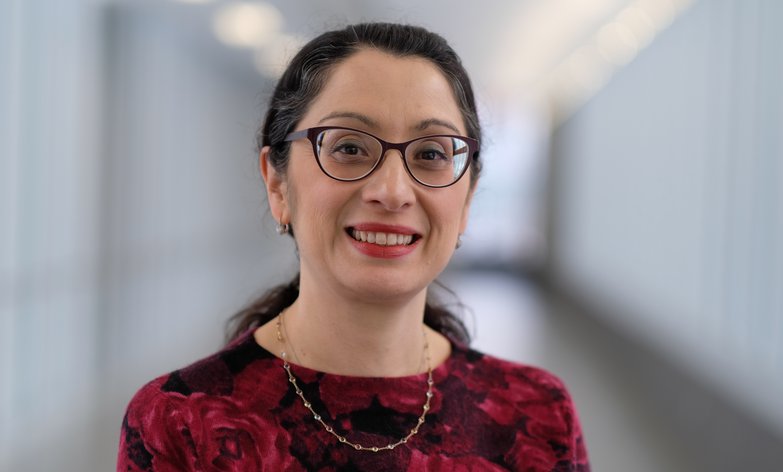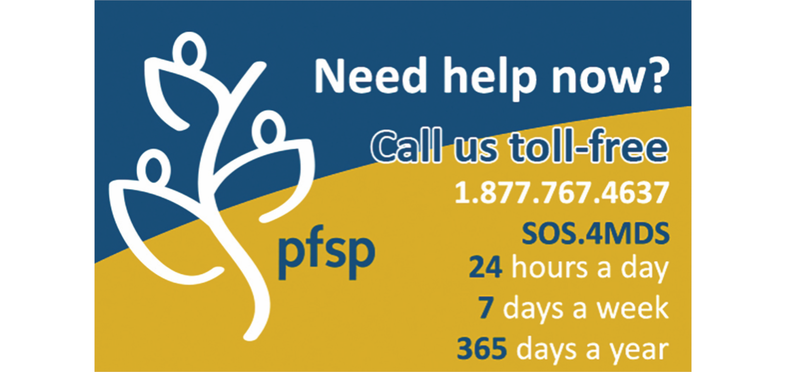Physician Wellness #GOAT (Greatest of All Time) is a PFSP initiative that celebrates physicians supporting colleagues wellness in a more open, supportive and compassionate culture for Alberta physicians.
When we caught up with Dr. Ioana Bratu, she was working on the Canadian Association of Pediatric Surgery (CAPS) Maslach Burnout Inventory Survey. This is an endeavor to measure the physician wellness of the pediatric surgeons in Canada. Working with the CAPS Advocacy Committee, steps to improve certain elements of the pediatric surgeons' personal, professional, and work-related issues are being explored.
What are your professional roles?
1. Pediatric General Surgeon, Stollery Children's Hospital
2. Site Section Chief for Trauma, Stollery Children's Hospital
3. Associate Professor, University of Alberta
4. Director of Undergraduate Surgical Education, University of Alberta

For you, what three thoughts describe the current state of physician wellness in Alberta?
- Physician burnout is linked to patient safety.
- There is a growing awareness of the issue with concrete action lagging.
- Physician viewed as a contractor has minimal working condition rights.
What three thoughts describe your goals related to physician wellness in Alberta?
- Increase acceptance that physician wellness is an essential metric of health care system quality.
- Increase awareness that physician wellness affects the personal and professional life of the surgeon and patient safety.
- Support surgeon wellness and promote that it is a shared responsibility at the level of individual, colleagues/peers, physician leaders, institution and government.
Tell us about something you are currently working on.
Canadian Association of Pediatric Surgeons Advocacy Committee
As a physician yourself, what is something you do intentionally to take care of your mental health?
Eat healthy, exercise, sleep more, and especially escape into painting and sculpting.
What is your cue that an area of your own wellness needs your attention?
If I feel anxious and down, I know I need to take some time to reflect and recharge.
What area of your wellness do you find the most challenging to look after?
Setting boundaries around time/commitments spent on work.
How is that different now than it was earlier in your career?
Earlier on in my career, I would easily accept any new task asked of me. As time went on, this was not sustainable or healthy, and I have begun to learn how to prioritize.
Choose one of your roles above, and tell us what your colleagues can expect from you in that role.
As Director of Undergraduate Surgical Education, I hope to transmit to our very talented medical students a positive experience on their surgical rotation where cultural shifts toward physician wellness can happen if introduced early on.
If you had the magic wand for physician wellness, what would you do?
Prescribe a daily dose of empathy, autonomy and flexibility in working conditions for physicians.
What one thing do you want your colleagues to know?
How do we start as keen, bright-eyed, energetic medical students and then over time become burned-out surgeons? Sustaining a career in surgery requires that we learn to live as surgeons and foremost as compassionate, forgiving beings to ourselves. Paying attention to our own physical well-being includes getting routine medical care and screening exams.
We need to identify the physical toll on our musculoskeletal system from the long operating room days and sub-optimal ergonomics, and take steps to alleviate this. Further, it is important to ensure consistent planned time and space for healthy nutrition, sleeping, exercising, nurturing important relationships, and spiritual mindfulness and gratitude.
Working less than 60 hours per week and having one night on-call per week has been shown to be favorable for surgeon well-being while working more than 60-80 hours per week and taking two or more nights on-call per week promotes burnout. However, this can be especially challenging in pediatric surgery where there may be a lack of control over call schedules.
Further, part-time work is often not possible due to the small number of pediatric surgeons working at many Canadian centres and frequently a lack of enthusiasm and support for additional recruitment. The issues of surgeon compensation and what constitutes an appropriate number of surgeons required for adequate coverage continues to be debated with no resolution. Improving surgeon well-being is a shared responsibility of the individual and one’s peers. It requires leadership and organizational strategies to promote engagement. Shanafelt et al outlined many of the drivers of burnout and engagement in physicians: workload and job demands; efficiency and resources; meaning in work, culture and values; control and flexibility; social support and community at work; and work-life integration. They identify how an individual and one’s work unit, in addition to the organizational and national factors, can influence physician wellness. The first step amongst the nine steps described by Shanafelt and his colleagues is to recognize there is a physician wellness issue and measure the problem.
Moving forward utilizes the power of leadership in advocating and supporting the development of work unit interventions. This may mean more resources or restructuring specific fiscal aspects of a practice, such as moving away from productivity-based compensation and favoring a team-based structure with salaries of stable income. Promoting flexibility on when and how physicians work, or investing in the work environment to facilitate appropriate breaks and nutrition are additional strategies.
With respect to physician wellness, what gets your #GOAT and why?
For those physicians who are feeling that their wellness is affected, do not struggle alone. Do not let the system isolate you. Reach out to be heard. Connect with all the tools/people who you think may be able to help (i.e., AMA, PFSP, CMPA, etc.).
And now for fun, tell us your preference in each of the following pairs.
Dog or cat - cat
Rural or urban - rural
Sweet or salty - savory!
Introvert or extrovert - introvert
Yoga or zumba - yoga
Text or call - call
Summer or winter - summer
Journal or meditate - journal
Sing or dance - dance
